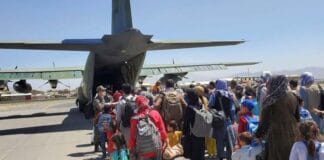ONLY A few months ago Democrats’ presidential nominee Barack Obama was a source of hope for those wanting to see an end to the wars in Iraq and Afghanistan. However, since his nomination, Obama has been steadily moving to the right, leading to a pro-war consensus in the US presidential race.
Obama embarked on a world tour in late July. He stopped in Kabul to take some happy snaps with US soldiers and reiterate his commitment to the war in Afghanistan, announcing that he wants a “mini-surge” of 7000 troops.
Obama went further than trying to merely boost his leadership credentials, urging President Bush to commit more troops now, “If we wait until the next administration it could be a year before we get those additional troops on the ground here in Afghanistan and I think that will be a mistake. I think the situation is getting urgent enough that we have got to start doing something now.”
The US presidential race is not a battle between an anti-war and a pro-war candidate—both McCain and Obama will keep troops in Iraq. It is a battle within the American ruling class about the focus and direction of the “war on terror”.
Obama could not have made his position any clearer, saying, “I believe [Afghanistan] has to be our central focus, the central front on our battle against terrorism.” McCain represents the more hawkish section of ruling class stressing military superiority and increasing the pressure on Iran (although, to complicate things, Obama has threatened to bomb Iran while McCain has pledged an extra 15000 troops for Afghanistan).
Obama, much like Kevin Rudd, portrays Afghanistan as the “good war” against the bad and unpopular occupation in Iraq.
Yet Afghanistan is just as much a bad war, and just as much about projecting US imperial power, as Iraq.
Aid agencies in Afghanistan report civilian casualties are up more than 60 per cent in the first half of this year, with 260 civilians were killed in July alone. Armed attacks have reached the highest level since 2001 up 50 per cent, with 140 suicide bombings and more US soldiers are dying in Afghanistan than in Iraq. Meanwhile, US and NATO air strikes have increased by about 40 per cent since last year.
Part of Obama’s strategy for Afghanistan is to put increasing pressure on Pakistan to “cooperate” with the war on terror. But President Pervez Musharraf, a key ally of the Bush administration, is under extreme pressure at home. His unpopularity is driven, in part, by the role he has played in the war on terror.
Now, the ruling coalition in Pakistan, consisting of the Pakistan People’s Party, led by Asif Ali Zardari, and the Pakistan Muslim League, headed by Nawaz Sharif, has moved to impeach Musharraf. The coalition came to power in February when Musharraf was humiliated in the elections. Since then, NATO incursions and bombings have killed civilians in Pakistan have increased the opposition to Musharraf. Elements of the coalition, in particular Sharif, are in favour of negotiations with the war lords of the Federally Administered Tribal Areas bordering Afghanistan.
While the result of the political turmoil in Pakistan is unpredictable, one thing is certain—the war in Afghanistan will be even more un-winnable if Pakistan withdraws its cooperation.
While Obama has called for a “mini-surge” of US troops, and Rudd has called for more NATO troops (although refusing to commit extra Australian troops in the short term), an extra 7000 troops would not be enough to gain control of Afghanistan. The outgoing US commander of NATO forces in Afghanistan, General Dan McNeill, said that it would need an additional 260,000 troops—more than the already stretched US forces could hope to deploy.
The US generals worry that shifting troops from Iraq to Afghanistan, could lead to a revival of the armed resistance in Iraq. Despite what Bush and the pro-war boosters would have us believe, the surge in Iraq has failed to defeat the resistance. The fall in armed incidents is only because the resistance has withdrawn from direct conflict with the extra US forces.
The occupation of Afghanistan is doomed. Civilian causalities are increasing and resistance to occupying forces is growing. Just like Bush, the “anti-war” leaders Obama and Rudd will be running an increasingly unpopular and un-winnable war.
By Ernest Price





